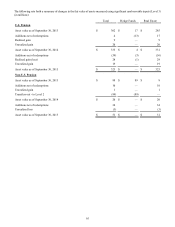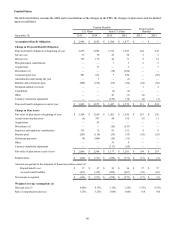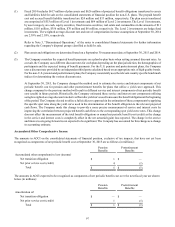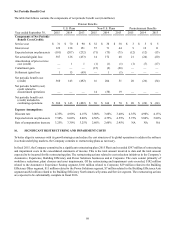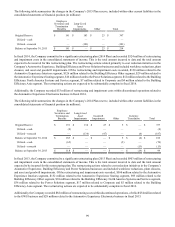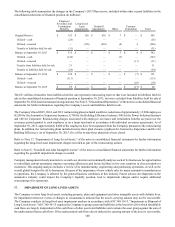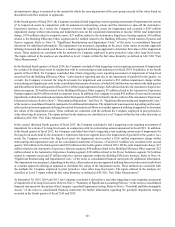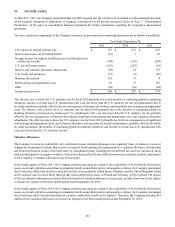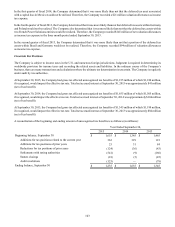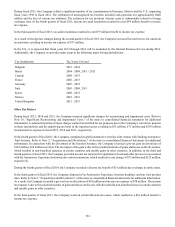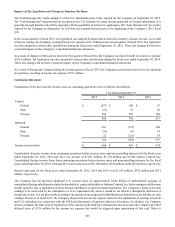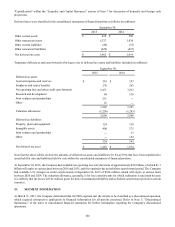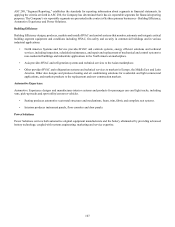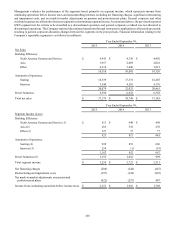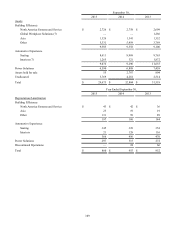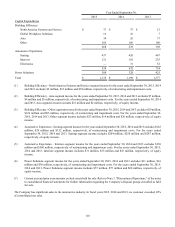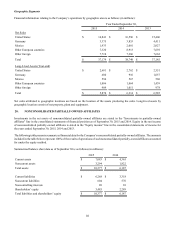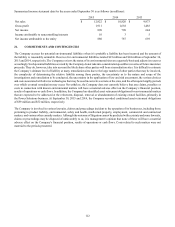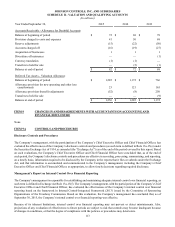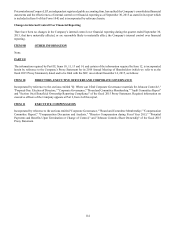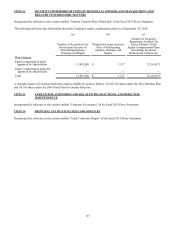Johnson Controls 2015 Annual Report Download - page 105
Download and view the complete annual report
Please find page 105 of the 2015 Johnson Controls annual report below. You can navigate through the pages in the report by either clicking on the pages listed below, or by using the keyword search tool below to find specific information within the annual report.
105
Impacts of Tax Legislation and Change in Statutory Tax Rates
The "look-through rule," under subpart F of the U.S. Internal Revenue Code, expired for the Company on September 30, 2015.
The "look-through rule" had provided an exception to the U.S. taxation of certain income generated by foreign subsidiaries. It is
generally thought that this rule will be extended with the possibility of retroactive application. The “look-through rule” previously
expired for the Company on September 30, 2014 but was extended retroactively to the beginning of the Company’s 2015 fiscal
year.
In the second quarter of fiscal 2015, tax legislation was adopted in Japan which reduced its statutory income tax rate. As a result
of the law change, the Company recorded income tax expense of $17 million in the second quarter of fiscal 2015. Tax legislation
was also adopted in various other jurisdictions during the fiscal year ended September 30, 2015. These law changes did not have
a material impact on the Company's consolidated financial statements.
As a result of changes to Mexican tax law in the first quarter of fiscal 2014, the Company recorded a benefit to income tax expense
of $25 million. Tax legislation was also adopted in various other jurisdictions during the fiscal year ended September 30, 2014.
These law changes did not have a material impact on the Company's consolidated financial statements.
As a result of foreign law changes during the second quarter of fiscal 2013, the Company increased its total reserve for uncertain
tax positions, resulting in income tax expense of $17 million.
Continuing Operations
Components of the provision for income taxes on continuing operations were as follows (in millions):
Year Ended September 30,
2015 2014 2013
Current
Federal $ (477) $ 109 $ 67
State (21) 15 30
Foreign 906 585 340
408 709 437
Deferred
Federal 201 (175) 204
State (31)(6) 14
Foreign 22 (121) 19
192 (302) 237
Income tax provision $ 600 $ 407 $ 674
Consolidated domestic income from continuing operations before income taxes and noncontrolling interests for the fiscal years
ended September 30, 2015, 2014 and 2013 was income of $1,051 million, $1,370 million and $1,960 million, respectively.
Consolidated foreign income (loss) from continuing operations before income taxes and noncontrolling interests for the fiscal
years ended September 30, 2015, 2014 and 2013 was income (loss) of $1,100 million, $546 million and $(192) million, respectively.
Income taxes paid for the fiscal years ended September 30, 2015, 2014 and 2013 were $1,163 million, $782 million and $531
million, respectively.
The Company has not provided additional U.S. income taxes on approximately $8.06 billion of undistributed earnings of
consolidated foreign subsidiaries included in shareholders’ equity attributable to Johnson Controls, Inc. Such earnings could become
taxable upon the sale or liquidation of these foreign subsidiaries or upon dividend repatriation. The Company’s intent is for such
earnings to be reinvested by the subsidiaries or to be repatriated only when it would be tax effective through the utilization of
foreign tax credits. It is not practicable to estimate the amount of unrecognized withholding taxes and deferred tax liability on such
earnings. However, in fiscal 2015, the Company did provide income tax expense related to the repatriation of earnings of certain
non-U.S. subsidiaries in connection with the GWS and Automotive Experience Interiors divestitures. In addition, the Company
needs to complete the final steps of repatriation of the cash proceeds from these transactions and, as a result, the Company provided
deferred taxes of $136 million for the income tax expense that would be triggered upon repatriation of this cash. Refer to


